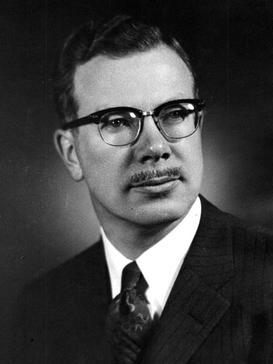
Dufferin "Duff" Roblin was a Canadian businessman and politician. He served as the 14th premier of Manitoba from 1958 to 1967. Roblin was appointed to the Senate of Canada on the advice of Prime Minister Pierre Trudeau. In the government of Brian Mulroney, he served as government leader in the Senate. He was the grandson of Sir Rodmond Roblin, who also served as Manitoba Premier. His ancestor John Roblin served in the Upper Canada assembly.

The New Democratic Party of Manitoba, also branded as Manitoba's NDP, is a social democratic political party in Manitoba, Canada. It is the provincial wing of the federal New Democratic Party, and is a successor to the Manitoba Co-operative Commonwealth Federation. It is currently the governing party in Manitoba.
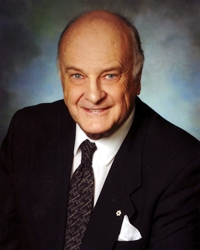
Howard Russell Pawley was a Canadian politician and professor who was the 18th premier of Manitoba from 1981 to 1988. Prior to his premiership, Pawley served in various ministerial positions after his tenure in the Legislative Assembly of Manitoba.

The Manitoba Liberal Party is a political party in Manitoba, Canada. Its roots can be traced to the late 19th century, following the province's creation in 1870.
The Progressive Conservative Party of Manitoba is a centre-right political party in Manitoba, Canada. It is currently the opposition party in the Legislative Assembly of Manitoba, following a defeat in the 2023 provincial election.
In Canada, a premier is the head of government of a province or territory. Though the word is merely a synonym for prime minister, it is employed for provincial prime ministers to differentiate them from the prime minister of Canada. There are ten provincial premiers and three territorial premiers. In most provinces and all territories, these persons are styled the Honourable only while in office, unless they are admitted to the King's Privy Council for Canada, in which case they retain the title even after leaving the premiership. In Nova Scotia and Alberta, former premiers are honorary members of the provincial Executive Council and thereby retain the style the Honourable for life.
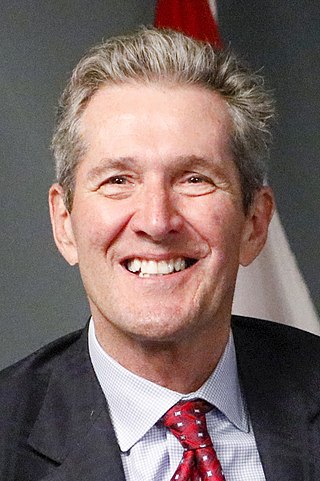
Brian William Pallister is a Canadian politician who served as the 22nd premier of Manitoba from 2016 until 2021. He served as leader of the Progressive Conservative Party of Manitoba from 2012 to 2021. He had been a cabinet minister in the provincial government of Gary Filmon and a member of the House of Commons of Canada from 2000 to 2008.
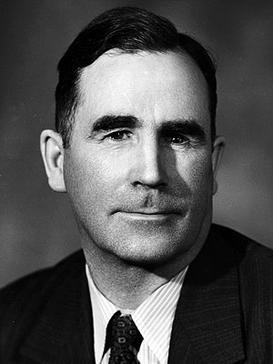
Douglas Lloyd Campbell was a Canadian politician in Manitoba. He served as the 13th premier of Manitoba from 1948 to 1958. He was a member of the Legislative Assembly of Manitoba for 47 years, longer than anyone in the province's history.
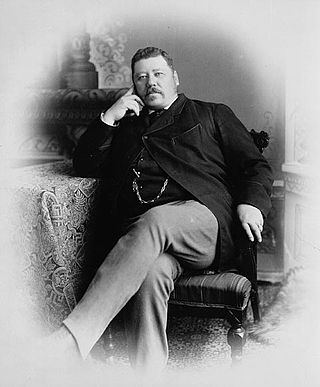
John Norquay was the fifth premier of Manitoba from 1878 to 1887. He was born near St. Andrews in what was then the Red River Colony, making him the first premier of Manitoba to have been born in the region. Norquay was also the first Indigenous Premier of a Canadian province, a title which is now honourarily held by Louis Riel.
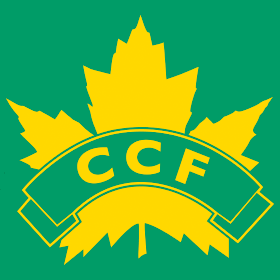
The Co-operative Commonwealth Federation (Manitoba) (CCF), known informally as the Manitoba CCF, was a provincial branch of the national Canadian party by the same name. The national CCF was the dominant social-democratic party in Canada from the 1930s to the early 1960s, when it merged with the labour movement to become the New Democratic Party. The Manitoba CCF, created in 1932, played the same role at the provincial level.
The Executive Council of Manitoba, more commonly known as the Cabinet of Manitoba, is the cabinet of the Canadian province of Manitoba. As of 2023, the current cabinet are members of the New Democratic Party, and have been since 2023.

Andrew James Swan is a politician in Manitoba, Canada. He served in the Legislative Assembly of Manitoba from 2004 to 2019. He was first elected in a 2004 by-election, replacing MaryAnn Mihychuk, who resigned to run for Mayor of Winnipeg.
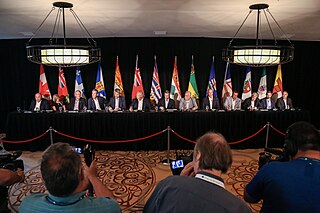
The Council of the Federation is a multilateral congress composed of the premiers of each of Canada's 13 provinces and territories, which meets at least twice annually.
Leonard Salusbury Evans was a Canadian politician in Manitoba. He was a member of the Manitoba legislature from 1969 to 1999 and was a Cabinet Minister in the governments of New Democratic Premiers Edward Schreyer and Howard Pawley.
The provincial secretary was a senior position in the executive councils of British North America's colonial governments, and was retained by the Canadian provincial governments for at least a century after Canadian Confederation was proclaimed in 1867. The position has been abolished in almost all provinces in recent decades ; the exceptions are Saskatchewan and Nova Scotia, where it still exists but is no longer a standalone senior portfolio.
Manitoba Finance is the department of finance for the Canadian province of Manitoba.
This is a list of leaders and office-holders of Canada. See also Canadian incumbents by year.

The Province of Manitoba, similar to other Canadian provinces and territories, is governed through a Westminster-based parliamentary system. The Manitoba government's authority to conduct provincial affairs is derived from the Constitution of Canada, which divides legislative powers among the federal parliament and the provincial legislatures. Manitoba operates through three branches of government: the executive, the legislative, and the judicial. The executive branch—the Government of Manitoba—consists of the Executive Council and the Premier, who is the head of government and the President of the Executive Council. The legislative branch—the Manitoba Legislature—is composed of the Lieutenant Governor and the Legislative Assembly, which is composed of the 57 members (MLAs) elected to represent the people of Manitoba, as well as the Speaker, the Clerk, the Officers of the Legislative Assembly, and the employees of the legislative service.
The powers and structure of the provincial Government of Manitoba are set out in the Constitution Act, 1867.

The following outline is provided as an overview of and topical guide to Manitoba: